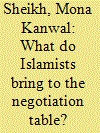| Srl | Item |
| 1 |
ID:
157091


|
|
|
|
|
| Publication |
New Delhi, Oxford University Press, 2016.
|
| Description |
xxiv, 212p.: ill.hbk
|
| Standard Number |
9780199468249
|
|
|
|
|
|
|
|
|
|
|
|
Copies: C:1/I:0,R:0,Q:0
Circulation
| Accession# | Call# | Current Location | Status | Policy | Location |
| 059270 | 297.72/SHE 059270 | Main | On Shelf | General | |
|
|
|
|
| 2 |
ID:
117043


|
|
|
|
|
| Publication |
2012.
|
| Summary/Abstract |
This article contributes to the growing subfield of research on religion and International Relations (IR) by discussing ways to take substantial and sui generis aspects of religion into account. It is argued that IR scholars need more critical methodological and conceptual reflection on how to integrate religion in order to navigate between two typical analytical positions: either focusing on the instrumental relevance of religion only or treating religion as an unchangeable meta-category and delinking it from its practitioners or context. The article first discusses why there is a need to be attentive to distinctive aspects of religion and then moves on to scrutinise three IR-relevant pathways to include these aspects of religion in analysis, namely religion as belief community, religion as power, and religion as speech act. It appears that future research along these lines can contribute significantly to the way IR scholars habitually think about key issues such as parameters of behaviour, standards of legitimacy, and the dynamics of conflicts.
|
|
|
|
|
|
|
|
|
|
|
|
|
|
|
|
| 3 |
ID:
134731


|
|
|
|
|
| Summary/Abstract |
The terrorist attacks on the World Trade Center and Pentagon on 9/11 2001 had a grave impact on the way the conflict dynamics in world politics have been shaped, structured and interpreted since then. The invasions of Afghanistan (2001) and Iraq (2003), the US drone programs launched during the first decade of the 00’s in countries like Pakistan, Yemen and Somalia and the more recent interventions in Libya (2011), and Mali (2013) have all at some point been related to the concern of combatting international terrorism. To fight or prevent international terrorism still appears as a top-priority for the great powers of the West and questions about the role of religion in explaining the motivations and occurrences of terrorist acts still remain topical.
|
|
|
|
|
|
|
|
|
|
|
|
|
|
|
|
| 4 |
ID:
134732


|
|
|
|
|
| Summary/Abstract |
This article deals with the definition of the religion sector of securitisation theory, and seeks to strengthen the contribution of securitisation theory to the study of religious violence and doctrinal conflicts. It is argued that the original elaboration of the security sector leans too heavily on a West-centric notion of religion as apolitical and of faith as a distinction between the sacred and the profane. These leanings limit the theory’s global applicability, consequently leading to a challengeable formula for the desecuritisation of conflicts with religious dimensions. Two alternative ways of integrating religion within a securitisation framework are suggested, one of which is based on a multidimensional concept of religion that embraces the different dimensions of religion defended by religio-political actors around the world. The second way focuses on doctrines in order to embrace equally the securitisation of doctrines conventionally designated as secular. It is also maintained that convincing reasons exist for treating religion/doctrine as a separate sector, despite the fact that religion appears to have cross-sectoral relevance. A religion/doctrine sector has strong defining characteristics that, in addition to the referent object(s), also include the criteria for survival and successful securitisation, the narrative structure of religious/doctrinal securitisations and the proclivity of religion/doctrine towards macrosecuritisation.
|
|
|
|
|
|
|
|
|
|
|
|
|
|
|
|
| 5 |
ID:
173735


|
|
|
|
|
| Summary/Abstract |
Is religion the main reason why negotiations with Islamists fail? Contemporary international relations literature views compromise over religious claims as being particularly difficult compared to other types of claims. Religious conflicts are understood as unique phenomena. Do religious factors explain why successful conflict resolution attempts with Islamists are more difficult to achieve than with other insurgent groups who pursue non-religious claims? This article examines the case of the Pakistani Taliban and the types of demands they have made during peace talks and in their communications. The role of religion is examined in this article and, specifically, theories of scarce resources, indivisibility and securitization are analyzed to explain the difficulties of negotiating with Islamists.
|
|
|
|
|
|
|
|
|
|
|
|
|
|
|
|